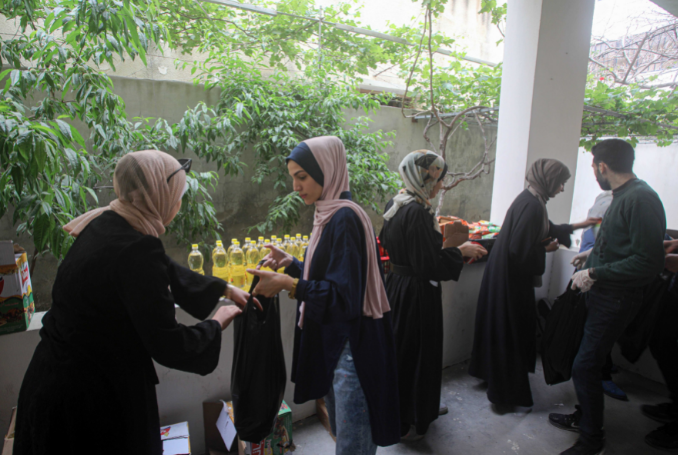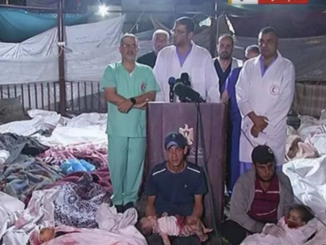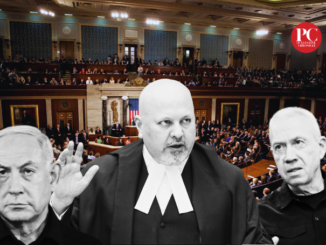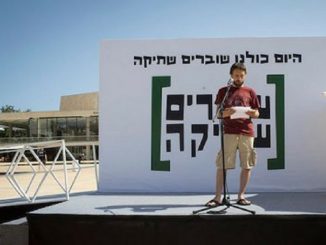
By Benay Blend
In “Food Sovereignty as a Path to Liberation,” Adala Justice Project and American Friends Service Committee combined resources to cover a recent public conversation hosted by Mohammed AbuJayyab and Asmaa Abu Mezied, climate and food sovereignty activists based in Gaza. Both agreed that agricultural production is at the core of building resistance, community and decolonization in the larger struggle for Palestinian liberation.
Released in 2008, Oscar-award winning documentary The Garden follows the rise, and eventual fall, of a 14-acre community garden in South Central Los Angeles. Created by the city as a means to heal divisions after the 1992 uprising following the police murder of Rodney King, the space was created by mostly Latin American immigrants long before food sovereignty became a buzz word.
The garden flourished for nearly a decade, a testament to the power of ordinary people to build community around food production that nourishes not only their bodies but also their growing political awareness. Its fall due to a backroom deal that destroyed the space in order to make way for warehouses and a soccer field, the latter an alleged boon to the community, illustrates what mistakes were made along the way that hopefully will be avoided by future farmers.
Much to their detriment, participants in the enterprise trusted city officials to accept a deal in which the farmers raised enough money to buy the land, an offer that was refused by then property owner Ralph Horowitz. Takeaways include the fact that successful food sovereignty depends on farmers who understand that only they can save themselves. Despite all of the celebrities who donated their money and star power to the project, the growers lost.
The film also illustrates divisions within the Black community in South Central L.A., as Juanita Tate, whose environmental justice work in the area is often celebrated, becomes in this case one of the project’s villains as she supports construction of the soccer field that would triumph over the garden in the end.
In “Lessons from the Pan-African Community Garden,” Onyesonwu Chatoyer, organizer for the Pan- African People’s Revolutionary Party- Southwest, tells a very different story. Along with comrades, relatives, neighbors, and other social justice organizations, members created a thriving garden space without non-profit status, corporate funding, grant applications, or financial/celebrity backing of the kind that in the end failed to save the South-Central farmers.
Ideology, organization, relationship building, and community are key factors in this enterprise, and so it feeds more than just the body. “All over the world,” Chatoyer explains, “members of the All African People’s Revolutionary Party engage in community defense projects, campaigns of positive action, institution and coalition building, and political education.”
“When we look around at the conditions in which we are doing this work,” Chatoyer continues, “we see a clearly looming food crisis that is a direct consequence of self-destructive US foreign policy and capitalist environmental destruction.” In the Southwest, she adds, we are also faced with water shortage due to a historic drought, so gardeners are confronted with figuring out how to grow higher yields under increasingly drier conditioners. Moreover, this summer major fires have destroyed historic villages in Northern New Mexico, a situation which only adds to our problems.
Lessons learned, she concludes, include one of the “key principle[s] of revolutionary work– that the organized masses of people, united by an ideology, strategy, and clear political objectives – can accomplish remarkable things with a fraction of the resources available to the forces opposing us.”
Gaza activists AbuJayyab and Abu Mezied echo Chatoyer’s words. Both understand that a “political and politicized challenge” requires a political solution, not the humanitarian paradigm that often comes to mind. “Food sovereignty,” they believe, “offers a more holistic and transformational approach.”
Like Chatoyer, they are leery of outside funding from groups that remain a large part of the problem. For example, the Sierra Club sponsors trips to occupied Palestine despite being called out by solidarity groups for their complicity in the greenwashing of Israel’s apartheid system.
While they welcome the outpouring of aid money to Gaza, both Abu Mezeid and AbuJayyab lament the way that international organizations shy away from the “political nature” of agricultural production in Palestine. “We really need to bring to the conversation how any agricultural intervention cannot be addressed in a depoliticized way, and any developmental efforts need to talk about food sovereignty rather than food security,” said Abu Mezeid.
Finally, they understand that Palestinians must stand at the center of their own resistance. Despite the need for help, they do not want NGOs to override “local cooperatives or indigenous resistance. “The fight for Palestine started as a fight for the commons. We need to go back not only to the techniques but the values. But we need the resources to actually get there,” claims AbuJayyab. “We are under-resourced. We need a ton of help to put more effort into the (cooperative) sector and education and work.”
All over the world populations are facing food insecurity. “African and Middle Eastern countries,” writes Ramzy Baroud, “which have been battling pre-existing problems of poverty, hunger and unemployment, are most affected.” In Palestine, however, the situation is more dire as it relies on Israel, an occupying power whose strategy is to displace Palestinians from their land.
As of two years ago, at least 73 percent of Gaza families faced food shortages due to the Israeli blockade placed on the Strip. According to Al Mezan Centre for Human Rights, thousands of Palestinians in Gaza live in absolute poverty.
During Ramadan 2022, Gaza volunteers initiated a project titled “from the poor to the poor” in which Palestinians dealt with food insecurity through communal cooking. With the aid of lentils, chicken, tomatoes, sugar and lots and lots of selfies,” young people in Gaza are also helping their communities fight the food crisis. For example, the “Kindness Campaign” was spearheaded by Palestinian youth to provide food aid to hundreds of Gaza’s families. Both projects rely on communal grassroots power in much the same way that Chatoyer describes the garden.
Abu Mezeid and AbuJayyab conclude with a call for transnational cooperation among groups who are struggling against colonization. “The intersection between these topics,” they conclude, whether in the Gaza strip or among Indigenous and Black Americans, calls for immediate action, “entangle[ing] our struggles, our resistance” towards a better world-wide future.

– Benay Blend earned her doctorate in American Studies from the University of New Mexico. Her scholarly works include Douglas Vakoch and Sam Mickey, Eds. (2017), “’Neither Homeland Nor Exile are Words’: ‘Situated Knowledge’ in the Works of Palestinian and Native American Writers”. She contributed this article to The Palestine Chronicle.







